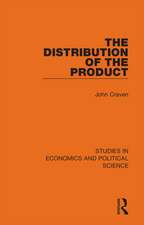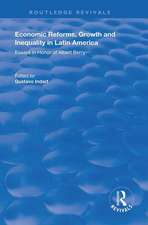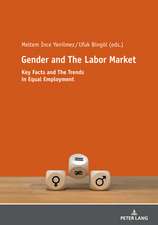Marx on Capitalism: The Interaction-Recognition-Antinomy Thesis: Historical Materialism
Autor James Furneren Limba Engleză Paperback – 8 ian 2020
In Marx on Capitalism, James Furner offers a new answer to the fundamental question of Marxism: can a thesis connecting capital, the state and classes with the desirability of socialism be developed from an analysis of the commodity? The Interaction-Recognition-Antinomy Thesis is anchored in a systematic retranslation of Marx's writings. It provides an antinomy-based strategy for grounding the value of social humanity in working-class agency, facilitates a dialectical derivation of political representation, and condemns capitalism as unjust without appeal to rights.
Din seria Historical Materialism
-
 Preț: 329.45 lei
Preț: 329.45 lei - 11%
 Preț: 357.69 lei
Preț: 357.69 lei -
 Preț: 364.56 lei
Preț: 364.56 lei -
 Preț: 257.84 lei
Preț: 257.84 lei -
 Preț: 214.33 lei
Preț: 214.33 lei -
 Preț: 225.71 lei
Preț: 225.71 lei -
 Preț: 256.73 lei
Preț: 256.73 lei -
 Preț: 328.60 lei
Preț: 328.60 lei -
 Preț: 213.77 lei
Preț: 213.77 lei -
 Preț: 213.65 lei
Preț: 213.65 lei -
 Preț: 216.77 lei
Preț: 216.77 lei -
 Preț: 215.25 lei
Preț: 215.25 lei -
 Preț: 182.61 lei
Preț: 182.61 lei -
 Preț: 263.96 lei
Preț: 263.96 lei -
 Preț: 464.33 lei
Preț: 464.33 lei -
 Preț: 216.79 lei
Preț: 216.79 lei -
 Preț: 215.29 lei
Preț: 215.29 lei -
 Preț: 214.33 lei
Preț: 214.33 lei -
 Preț: 293.65 lei
Preț: 293.65 lei -
 Preț: 177.69 lei
Preț: 177.69 lei -
 Preț: 293.65 lei
Preț: 293.65 lei -
 Preț: 213.77 lei
Preț: 213.77 lei -
 Preț: 327.00 lei
Preț: 327.00 lei - 11%
 Preț: 390.05 lei
Preț: 390.05 lei -
 Preț: 215.12 lei
Preț: 215.12 lei -
 Preț: 472.05 lei
Preț: 472.05 lei -
 Preț: 215.12 lei
Preț: 215.12 lei - 11%
 Preț: 425.07 lei
Preț: 425.07 lei - 11%
 Preț: 421.92 lei
Preț: 421.92 lei -
 Preț: 258.37 lei
Preț: 258.37 lei -
 Preț: 351.49 lei
Preț: 351.49 lei -
 Preț: 511.89 lei
Preț: 511.89 lei -
 Preț: 292.89 lei
Preț: 292.89 lei -
 Preț: 216.24 lei
Preț: 216.24 lei -
 Preț: 257.18 lei
Preț: 257.18 lei -
 Preț: 256.89 lei
Preț: 256.89 lei -
 Preț: 178.73 lei
Preț: 178.73 lei -
 Preț: 315.36 lei
Preț: 315.36 lei -
 Preț: 214.03 lei
Preț: 214.03 lei -
 Preț: 180.75 lei
Preț: 180.75 lei - 11%
 Preț: 427.25 lei
Preț: 427.25 lei -
 Preț: 214.03 lei
Preț: 214.03 lei -
 Preț: 257.89 lei
Preț: 257.89 lei -
 Preț: 147.76 lei
Preț: 147.76 lei -
 Preț: 186.78 lei
Preț: 186.78 lei -
 Preț: 466.28 lei
Preț: 466.28 lei -
 Preț: 186.78 lei
Preț: 186.78 lei -
 Preț: 313.55 lei
Preț: 313.55 lei -
 Preț: 465.31 lei
Preț: 465.31 lei -
 Preț: 227.62 lei
Preț: 227.62 lei
Preț: 350.52 lei
Nou
67.09€ • 72.90$ • 56.39£
Carte tipărită la comandă
Livrare economică 21 aprilie-05 mai
Specificații
ISBN-10: 1642590460
Pagini: 522
Dimensiuni: 152 x 229 x 63 mm
Greutate: 0.7 kg
Editura: Haymarket Books
Seria Historical Materialism
Notă biografică
James Furner, Ph.D., is the author of several articles on Marx and Kant.
Cuprins
Acknowledgements References and Abbreviations
1 The Interaction-Recognition-Antinomy Thesis
1 The Interaction Component
2 The Recognition Component
3 The First Antinomy
4 The Second Antinomy
5 An Outline of the Argument Appendix: A Note on Translation
2 Analytical Marxism
1 The Project of Analytical Marxism
2 Dialectical Contradiction
3 Intrastructuration
4 Conclusion
3 Commodity Form Philosophy
1 Use-Value
2 Value
3 Commodities and Goods
4 Use-Values, Goods and Duties to the Whole
5 The Commodity, Dialectical Contradiction and Real Abstraction
6 Antinomies of the Commodity Form
4 Action
1 Capital's Description of Human Labour
2 In-Order-To Motives and Because Motives
3 Orientation to an In-Order-To Motive
4 The Form of an In-Order-To Motive
5 Action and Abstraction
5 Social Relations
1 Marx's General Remarks on Social Relations
2 Schütz's Typology of Social Action
3 Interaction as a Relation of Mutual Affecting
4 The Problem of Normativity
5 An Interactional Conception of a Social Relation of Production
6 Some Objections
7 The Objection from Structure
8 The Objection from Consciousness
9 The Problem of Legality
6 System and Bearer
1 A Generalised Interactions Conception of Social Structure
2 Sociological Thought and the Concept of Social Role
3 The Features of a System
4 The Capitalist Structure as a System
5 The Capitalist Structure as a System (Continued)
6 Actors as Bearers
7 Purchase and Sale
1 Exchange
2 Independent Exchange of Products
3 Possession:Savigny and Marx
4 Commodities and Money
8 Exploitation
1 The Quantitative Marxist View of Exploitation
2 A Non-Normative Concept of Exploitation
3 Bazard, Marx and the Five Conditions for Exploitation
4 The Benefit Condition
5 The Harm Condition
6 The Causal Condition
7 The Consequence Condition
8 The Means-to-Ends Condition
9 The System Universalisability Conception of Exploitation
10 Capitalist Labour-Exploitation
11 The Exploitation and Need Problem
12 The Agency Problem
13 The Capitalism, Rights and Injustice Problem
14 Summary
9 Recognition and Self-Ownership
1 A Pragmatic Conception of Recognition
2 Possession, Private Property Ownership and Recognition
3 As-If Mutual Recognition in Purchase and Sale
4 Marx's Concept of a Person
5 Security and Self-Ownership
10 Recognition and Bureaucratic Domination
1 Marx's General Conception of Domination
2 Domination and the Will
3 Domination and Alien Will
4 Domination and Recognition
5 Marx's Conception of Domination Restated
6 Formal and Real Subsumption
7 Domination and Formal Subsumption
8 Domination and Real Subsumption
9 The Recognition Condition and Occupational Identity
10 Summary
11 Antinomy and State Form
1 A Derivation of the Juridical Logic of Freedom of Choice
2 Individual Human Rights
3 The System of Capitalist Production and Popular Sovereignty
4 The Antinomy of Natural Rights and Popular Authorisation
5 Parliamentary Representation
6 The Separation of Powers
12 The Rights-Antinomy and Class Struggle
1 An Antagonistic Interdependency Conception of Classes
2 Class Antagonism at the Macro-Level
3 The Self-Consciousness of the Commodity
4 Capital's Antinomy Passage: A Reconstruction
5 The Rights-Antinomy and the Capitalist Class Interest Claim
6 Interest Privilege and Possible Practical Awareness
7 The Rights-Antinomy, Recognition and Union Organisation
8 Working-Class Movements
9 A Resolution of Both Antinomies
Conclusion
1 Exploitation and Injustice
2 The Disappearance of Analytical Marxism
3 The State of Capitalist Society
4 Revolutionary Awareness
Bibliography Index



























